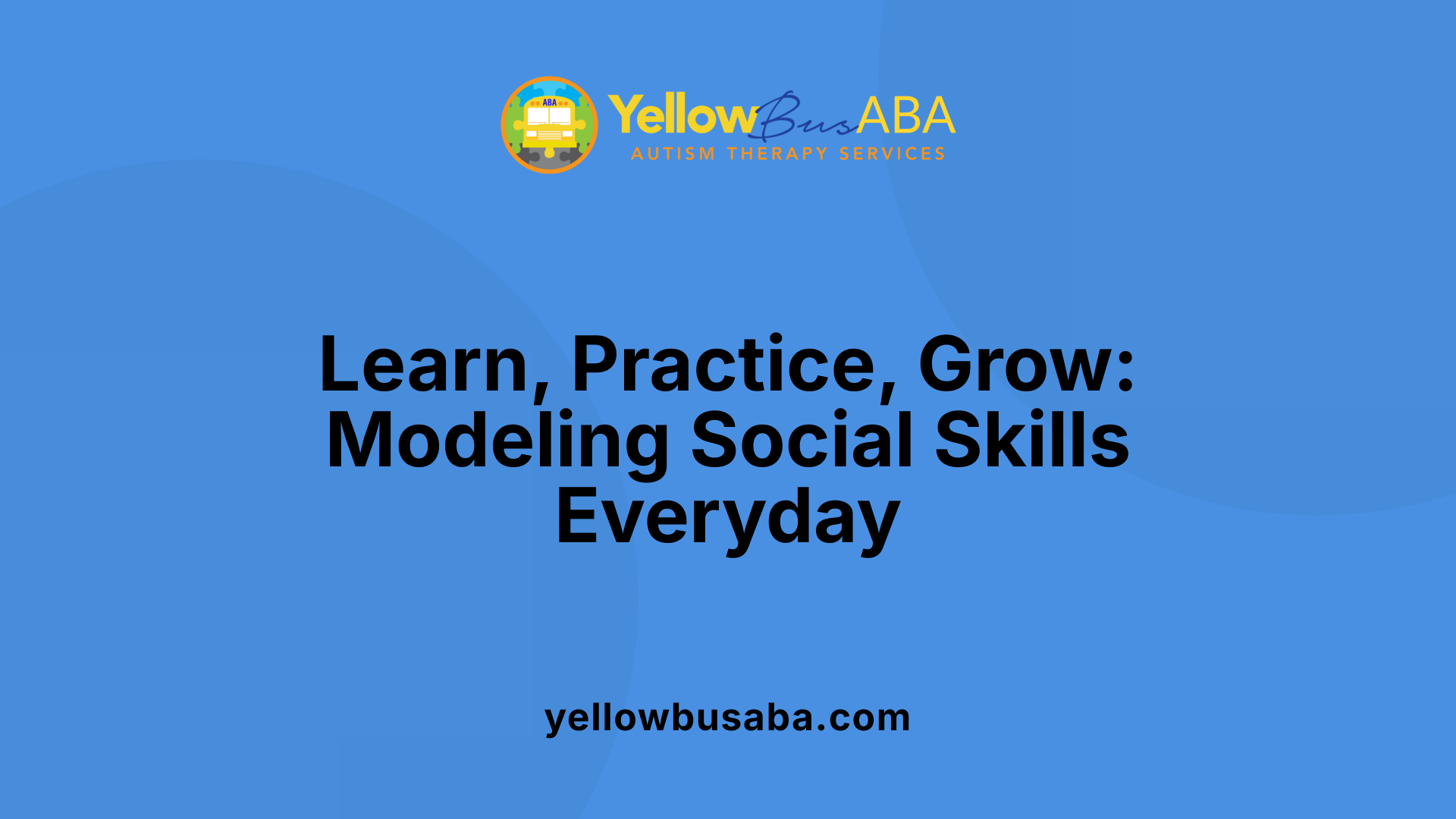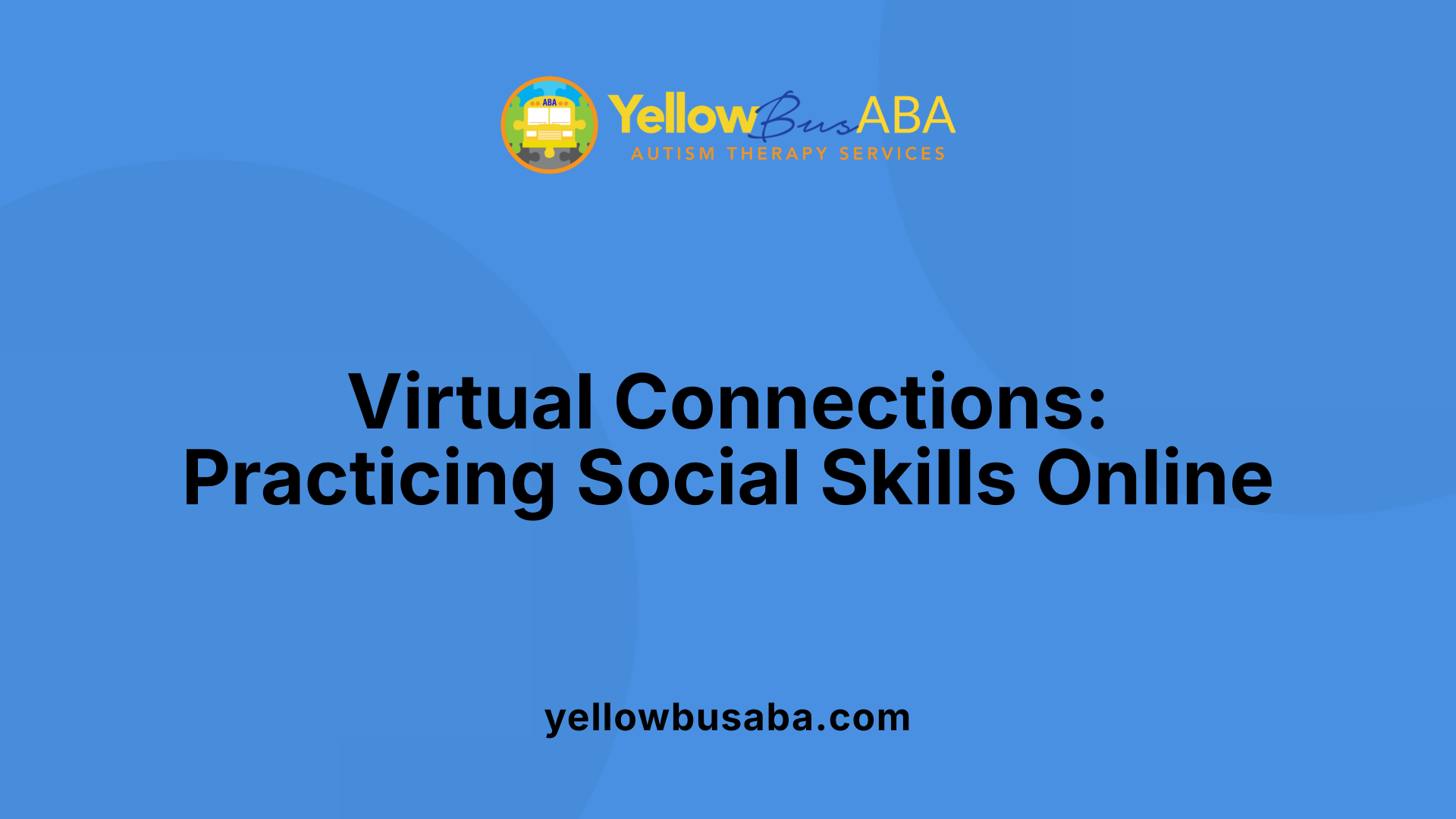Understanding the Impact of Parent Training on Social Development
Parent training plays a pivotal role in supporting children’s social skill development within the home environment. By equipping parents with evidence-based strategies and practical techniques, families can create nurturing spaces that foster social competence, emotional regulation, and positive interactions. This article explores how parent-led interventions, guided by behavior analysts and grounded in Applied Behavior Analysis (ABA), empower parents to reinforce therapeutic gains and adapt social skills training to daily routines.
Modeling Social Skills Through Daily Interactions
 Parents play a vital role in nurturing their children's social skills by actively modeling positive behaviors in everyday situations.
Parents play a vital role in nurturing their children's social skills by actively modeling positive behaviors in everyday situations.
One foundational skill is taking turns, which can be demonstrated during shared activities such as games or household chores. Explaining the importance of patience and fairness helps children understand social norms.
Seeing things from someone else’s perspective is another critical skill. Parents can encourage this by discussing characters’ actions in TV shows or books, talking about how others might feel, and asking children how they would feel in similar circumstances.
Being flexible at home involves adapting routines and expectations, especially when children face challenges. Showing understanding and resilience teaches children that adjusting to change is a normal part of social interactions.
Parents can support these skills through consistent and intentional interactions, creating a safe environment where children feel comfortable practicing new behaviors. Reinforcing positive social actions with praise and gentle guidance fosters confidence.
In addition, engaging in activities like role-playing social scenarios helps children simulate real-life interactions. Observing and discussing social cues observed in media or daily encounters deepen their understanding.
Overall, regular modeling of respectful communication, empathy, and adaptability lays a strong foundation for children to develop healthy social behaviors, including those with autism who may need extra support to learn these skills.
Integrating Social Skills into Everyday Activities

How can parents implement social skills training at home practically?
Parents play a crucial role in helping children develop social skills within their daily routines. One effective approach involves modeling behaviors such as taking turns, showing empathy, and being flexible during everyday interactions. When parents demonstrate these skills, children observe and imitate appropriate social responses.
Incorporating activities like role-playing social interactions allows children to practice real-world scenarios in a safe environment. For example, parents can simulate conversations, sharing, or greeting peers, helping children understand social cues and body language.
Watching TV shows or movies together provides another opportunity for learning. Discussing characters' interactions and social cues helps children recognize facial expressions, tone of voice, and social norms. This method makes learning engaging and relatable.
Encouraging children to connect with friends and family via video chats or online games offers genuine practice of social skills beyond the home. After these interactions, parents can reflect with children about what went well and areas for improvement, reinforcing social understanding.
Parents can also use visual supports like emotion charts or social stories with scripts tailored to common social situations. These tools help children recognize emotions and respond appropriately.
Participating in research-based social skills programs or using structured social scripts equips parents with practical strategies. These tools provide step-by-step guidance for teaching social norms—making complex concepts accessible.
In summary, practical home-based social skills training involves modeling positive behaviors, engaging in role-playing, discussing media content, encouraging virtual social interactions, and utilizing visual supports. These strategies, combined with patience and understanding, foster meaningful social development in children.
Supporting Social Interactions Through Technology and Virtual Platforms

How can connecting with friends via video chats help children practice social skills?
Connecting with friends and family through virtual platforms offers children a safe and accessible way to practice social interactions. Video chats allow kids to engage in conversations, share experiences, and observe social cues such as facial expressions and tone of voice. These interactions mirror real-life engagements but provide a controlled environment, especially beneficial for children with autism who may find in-person socializing challenging.
In what ways can reflecting on virtual social interactions enhance social development?
After virtual interactions, parents and children can discuss what went well and what could be improved. Reflecting on these conversations helps children recognize social cues and understand social norms. It encourages self-monitoring of behavior, like taking turns or maintaining eye contact, fostering greater social awareness and confidence.
How do online platforms help build social confidence in children?
Regular online social experiences help children become more comfortable initiating interactions and expressing themselves. As they experience positive exchanges and develop routines around virtual visits, children often display increased social confidence. Parents can reinforce this progress by praising efforts and teaching emotional recognition, laying the groundwork for successful real-world social interactions.
How does parent training support social skills development at home?
Parent training plays a vital role by equipping families with strategies based on evidence-based practices, such as positive reinforcement and modeling. Workshops and guidance help parents create routines that incorporate social skills practice—like shared reading, cooperative games, and descriptive praise. They learn to prepare their children for social situations, manage behaviors, and reinforce skills learned in therapy.
Parents are also trained to foster a nurturing environment filled with warmth and respect. This creates a positive space where children feel safe to practice and refine social behaviors. Consequently, parents become confident in supporting social development at home, helping children generalize skills across different settings.
| Strategy | Focus | Benefit |
|---|---|---|
| Video chats | Practice conversation, social cues | Builds familiarity and comfort with social interactions |
| Reflection | Analyzing social exchanges | Enhances self-awareness and social understanding |
| Reinforcement | Reward progress | Boosts motivation and confidence |
| Structured activities | Routine social practice | Reinforces learned skills and routines |
| Parent training | Guided strategies and confidence | Ensures consistency and effective support |
Supporting children's social development involves a combination of online interactions, reflective practice, and active parental involvement. When these elements are integrated into daily routines, children gain essential social skills necessary for meaningful connections and emotional growth.
The Role of Behavior Analysts and Evidence-Based Interventions

What role do behavior analysts and Applied Behavior Analysis (ABA) play in parent-led social skills development?
Behavior analysts are essential professionals in supporting children with autism by guiding parents through effective social skills development strategies. They provide tailored parent training sessions that cover the principles of ABA, a science-based approach proven to improve social, communication, and daily living skills.
During these sessions, behavior analysts help parents learn to implement evidence-based techniques such as positive reinforcement, behavioral replacement, and breaking complex tasks into manageable steps. They also educate parents on recognizing behavioral patterns and managing challenging behaviors through tailored interventions.
One of the key roles of behavior analysts is designing individualized social skill plans that specifically address each child's unique challenges. These plans set clear, achievable goals and integrate routine-based activities to practice social interactions, like greeting others or participating in cooperative play.
By supporting parents with continuous guidance, behavior analysts ensure that strategies are consistently applied across different home environments. This consistency helps children generalize social behaviors beyond therapy sessions, leading to more meaningful and lasting improvements.
Ultimately, behavior analysts act as partners with families, empowering them to foster social skills and independence in children with autism. Their expertise transforms structured therapy approaches into everyday moments, making social skill development a natural part of a child's growth.
| Aspect | Description | Example |
|---|---|---|
| Guiding parent training | Teaching parents evidence-based ABA techniques | Demonstrating positive reinforcement methods |
| Administering ABA techniques at home | Helping parents apply strategies consistently | Using visual aids to reinforce social cues |
| Designing individualized plans | Creating tailored goals for social and behavioral skills | Developing a daily routine structure to practice greetings |
| Behavioral strategies | Including positive reinforcement and behavioral replacement | Reinforcing sharing with praise |
| Generalization across settings | Ensuring skills transfer beyond therapy | Practicing social scenarios in different settings |
This collaborative effort equips parents to become active agents in their child's social growth, supported by professional expertise.
Creating Supportive and Structured Home Environments

How can parents support children with autism in developing social skills through training?
Parents play a vital role in nurturing their child's social abilities, especially when they participate in specialized training programs. These programs provide parents with practical tools and strategies for fostering social interaction, communication, and appropriate behaviors.
Evidence-based parental training, such as the Caregiver Skills Training (CST) and the Incredible Years Parent Program, emphasizes structured psychoeducation and coaching. These programs include activities like role-playing, naturalistic teaching, and behavioral techniques designed to encourage social initiation, reciprocity, and emotional regulation.
Through consistent involvement, parents learn how to implement these strategies across daily routines, thereby reinforcing their child's progress. Early intervention is especially effective. It helps children develop social skills while reducing challenging behaviors.
Support groups and online resources offer additional guidance, helping parents feel empowered and more confident.
Establishing social routines
Creating clear, predictable routines around social interactions builds comfort and confidence. For example, designated times for playdates or family activities can help children practice sharing, turns, and cooperation. Using visual supports such as social stories or visual schedules guides children through expected behaviors.
Using visual supports and social scripts
Visual supports like charts or cue cards can help children understand social norms, such as making eye contact or greeting others. Social scripts—pre-prepared phrases for common situations—can guide children in initiating conversations or expressing emotions.
Managing transitions and challenging behaviors
Transitions, such as moving from play to mealtime, can be difficult. Visual timers or warnings prepare children for change, reducing anxiety. When challenging behaviors occur, parents trained in behavioral strategies can intervene calmly, using positive reinforcement and behavioral replacement techniques.
Fostering independence
Supporting independence includes teaching children to communicate their needs effectively and participate in daily routines. Role-playing scenarios help children practice social skills safely. Reinforcing effort and progress encourages further independence.
| Strategies | Examples | Benefits |
|---|---|---|
| Social routines | Scheduled playdates | Builds social confidence |
| Visual supports | Social stories | Clarifies expectations |
| Managing transitions | Visual timers | Reduces anxiety |
| Promoting independence | Role-playing | Enhances self-reliance |
By integrating these practices into daily life, parents can create a nurturing environment that promotes social skills growth, making a meaningful difference in their child's development.
Fostering Sustainable Social Skills in Children
Parent training creates a foundation for ongoing social development by empowering families with the knowledge and skills to be active participants in their children's social growth. By incorporating modeling, reinforcement, structured routines, and evidence-based techniques, parents can nurture social competence effectively at home. Continuous learning, supported by behavior analysts and tailored intervention plans, enables families to adapt to each child's evolving needs, fostering resilience, confidence, and meaningful social relationships that extend beyond the home environment. Ultimately, a collaborative, informed approach to parent-led social skills development ensures children with Autism and other developmental challenges can achieve greater social independence, integration, and well-being.
References
- Teaching Social Skills at Home - Child Mind Institute
- Coaching Parents on the Importance of Practicing Social Skills in ...
- Parent Training with Solstice: Empowering Families to Support ...
- 5 Proven Strategies Delaware Parents Use to Build Confidence
- Parenting Support - How Behavior Analysts Can Help
- The effectiveness of applied behavior analysis program training on ...
- Helping Parents Understand Applied Behavior Analysis: Creating a ...
- Applied Behavior Analysis (ABA) | Autism Speaks
- Building Social and Emotional Skills at Home - NAEYC


.avif)
.jpg)


